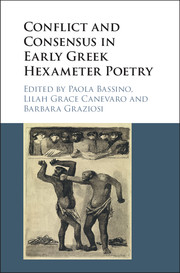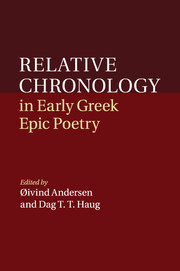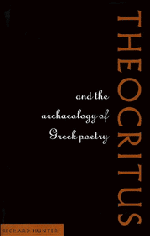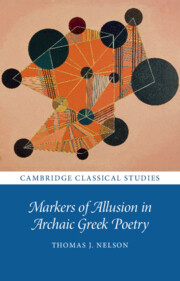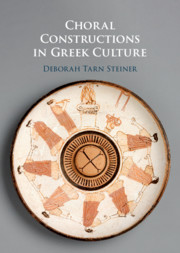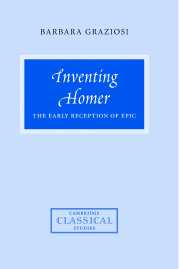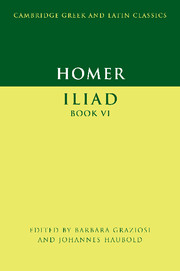Conflict and Consensus in Early Greek Hexameter Poetry
- Editors:
- Paola Bassino, University of Winchester
- Lilah Grace Canevaro, University of Edinburgh
- Barbara Graziosi, University of Durham
- Date Published: April 2017
- availability: Available
- format: Hardback
- isbn: 9781107175747
$
120.00
Hardback
Other available formats:
eBook
Looking for an inspection copy?
This title is not currently available for inspection. However, if you are interested in the title for your course we can consider offering an inspection copy. To register your interest please contact [email protected] providing details of the course you are teaching.
-
Achilles inflicts countless agonies on the Achaeans, although he is supposed to be fighting on their side. Odysseus' return causes civil strife on Ithaca. The Iliad and the Odyssey depict conflict where consensus should reign, as do the other major poems of the early Greek hexameter tradition: Hesiod's Theogony and the Homeric Hymns describe divine clashes that unbalance the cosmos; Hesiod's Works and Days stems from a quarrel between brothers. These early Greek poems generated consensus among audiences: the reason why they reached us is that people agreed on their value. This volume, accordingly, explores conflict and consensus from a dual perspective: as thematic concerns in the poems, and as forces shaping their early reception. It sheds new light on poetics and metapoetics, internal and external audiences, competition inside the narrative and competing narratives, local and Panhellenic traditions, narrative closure and the making of canonical literature.
Read more- The first comprehensive analysis of themes central to the early Greek hexameter tradition
- Focuses on issues of poetics and metapoetics
- Contributes to our understanding of the processes of reception and canonisation of early Greek epic poetry
Customer reviews
Not yet reviewed
Be the first to review
Review was not posted due to profanity
×Product details
- Date Published: April 2017
- format: Hardback
- isbn: 9781107175747
- length: 238 pages
- dimensions: 235 x 158 x 15 mm
- weight: 0.47kg
- availability: Available
Table of Contents
Introduction
Part I. Gods:
1. Conflict, consensus and closure in Hesiod's Theogony and Enūma eliš Johannes Haubold
2. Divine conflict and the problem of Aphrodite Barbara Graziosi
3. Sparring partners: fraternal relations in the Homeric Hymn to Hermes Oliver Thomas
Part II. Heroes:
4. Achilles in control? Managing oneself and others in the funeral games Adrian Kelly
5. Uncertainty and the possibilities of violence: the quarrel in Odyssey 8 Jon Hesk
6. ΙΡΟΣ ΙΑΜΒΙΚΟΣ: archilochean Iambos and the Homeric poetics of conflict Donald Lavigne
7. Conflict and consensus in the epic cycle Jim Marks
Part III. Men:
8. Fraternal conflict in Hesiod's Works and Days Lilah Grace Canevaro
9. On constructive conflict and disruptive peace: the Certamen Homeri et Hesiodi Paola Bassino.
Sorry, this resource is locked
Please register or sign in to request access. If you are having problems accessing these resources please email [email protected]
Register Sign in» Proceed
You are now leaving the Cambridge University Press website. Your eBook purchase and download will be completed by our partner www.ebooks.com. Please see the permission section of the www.ebooks.com catalogue page for details of the print & copy limits on our eBooks.
Continue ×Are you sure you want to delete your account?
This cannot be undone.
Thank you for your feedback which will help us improve our service.
If you requested a response, we will make sure to get back to you shortly.
×
